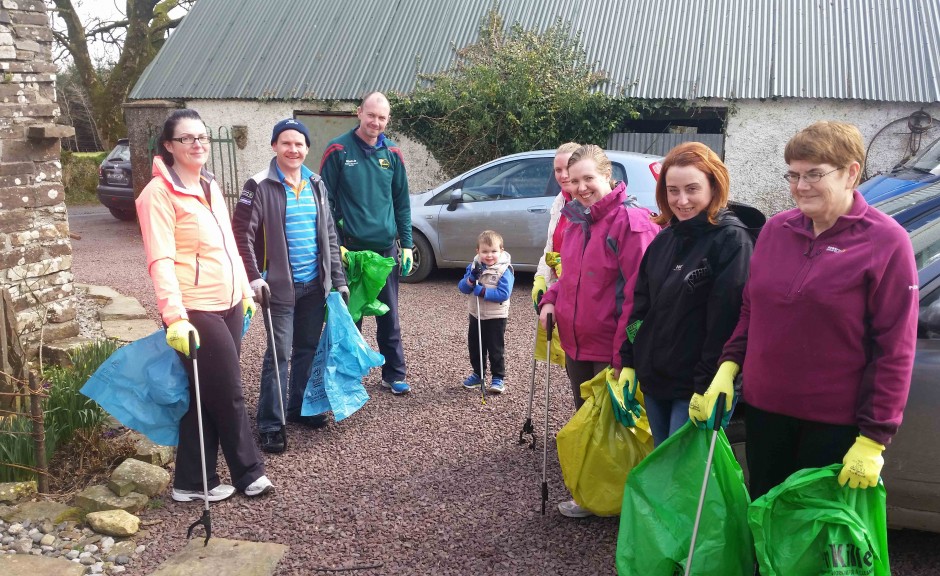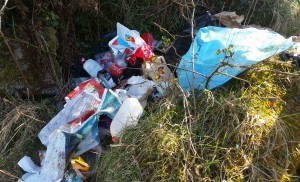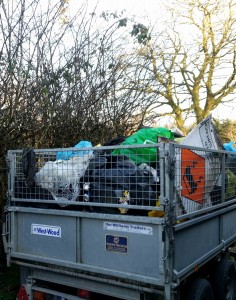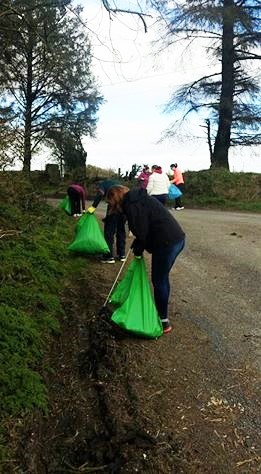
Community Clean-Ups
Have you ever been involved with a community clean up? Far from being an ‘obligation’, it can be a rewarding experience. On the Sunday of St Patrick’s weekend, sixteen of our neighbourhood got together and spent the afternoon picking up litter that other people had thrown into the hedgerows. As a result we transformed our rural area.

Whilst we were expecting to find piles of rubbish that had been dumped on the edges of the woodland, the surprise came from seeing just how much litter had been carelessly discarded into the hedgerows, most likely thrown out of vehicle windows.
During the clean-up we picked up so many bags of rubbish we couldn’t safely squeeze another into the high sided trailer the council provided for us. We began to pick up around the flytipping areas where nappies, general waste, bottles and cans were strewn across the forest floor, but it was too much for us on this occasion.

Rubbish that could be recycled
The general rubbish we came across in the hedgerows and ditches was mainly made up of beer cans and bottles, empty cigarette packets and take-away food wrappers; most of it recyclable for free if the litter bugs had gone to the trouble. It was impossible to walk for more than two paces in some areas without stopping to pick up more.
“If we don’t pick it up, who else will?”
Faced with the idea of collecting so much rubbish, you might be wondering why you should even consider picking it up, never mind doing it. The thing is, if we don’t pick it up, who else will?

The Local Authority and Coillte will help with the flytipping and will even go to the trouble of looking through bags for evidence of the dumpsters so they can take them to court and prosecute. As for the rest, have you ever seen Local Authority workers out and about litter picking along the rural hedgerows or highways? They simply don’t have the staff or budgets to do so.
A sad fact of our 21st century lives is that not everyone is considerate of other people or the environment around them. They’re not concerned that the lanes are littered in a country that prides itself on being ‘green’ and attracts millions of tourists, helping to keep local economies afloat. The minorities that litter don’t care and they probably never will.
It therefore falls on those who do care, to pick up that tin or bottle, to make sure that we can not only be proud of the areas we live in when people visit us, but also that our wildlife are safe and the pollutants aren’t adding to the other pressures on our environment.
How to organise a community clean-up

If you’d like to organise a litter clean up in your area, here’s how to do it.
- Contact all the neighbours and ask if they’d like to get involved. We set up a secret Facebook group for our area so everyone could keep abreast of what was happening. This might also come in useful for other rural community events we organise later. We sent texts to those who weren’t on social media and next year we’ll create a small flyer and pop it into letter boxes so we don’t miss anyone out again.
- Choose a date. This was the hardest part of the exercise as it’s impossible to please everyone. In the end we chose a Sunday, but later found it coincided with a local wedding weekend. It was too late to re-arrange so despite falling into their beds at 4am, most of the neighbours turned up anyway. Tip:April is National Spring Cleaning month in Ireland.If most of your litter picking is in a rural area, choose a day early in the month as the rubbish is easier to get to. Much later and the hedgerows will have grown too much to get into them easily.
- Register with An Taisce. They have details and tips on their website about how you can get involved in the national initiative in April and if you register with them, your group will fall under their Third Party Public Liability Insurance.
- Contact your local Environment Department in your Local Authority and ask them for help. Our local office arranged for a trailer to be at ours for the weekend, along with gloves and rubbish bags. They also loaned us pick up sticks which made the task a lot easier.
- Organise yourselves into small groups. It’s more fun cleaning up with friends and neighbours than on your own and if you’re sorting the rubbish as you go, it’s much easier.
- Leave the full bags at the side of the road and collect them later. It’s surprising how quickly you’ll fill the bags and how heavy they get. We left them tied up at the side of the road once we’d filled them and collected them all later.
- Organise a celebration tea afterwards. On our clean up day most of the people involved wandered home after three hours of walking and cleaning up but it would have been a great opportunity to eat cake, sup tea and generally get to know one another better.
- Agree among yourselves a small area that you will keep clean after the tidy up. We didn’t do this but it’s been recommended and the benefits are obvious.
Finally, grit your teeth, smile at your group achievements and don’t let the litter bugs get you down. As much as we hate it, unless we see people throwing their rubbish into the hedgerows or flytipping, there’s not much we can do. By helping out for a few hours once a year, we can make our communities better places. If you do get involved, know that you’re doing an amazing and worthwhile job. Celebrate your achievements and try not to dwell on the fact that not everyone cares as much about people and the planet as you do, there are still lots of us who do. Together, we can make a difference.
Have you ever been involved in a clean up? Will you consider organising one or getting involved in the future?
Source: Greenside Up – How to Organise a Community Clean-up





